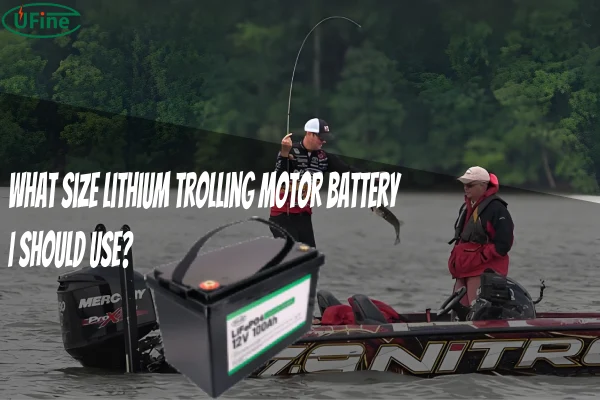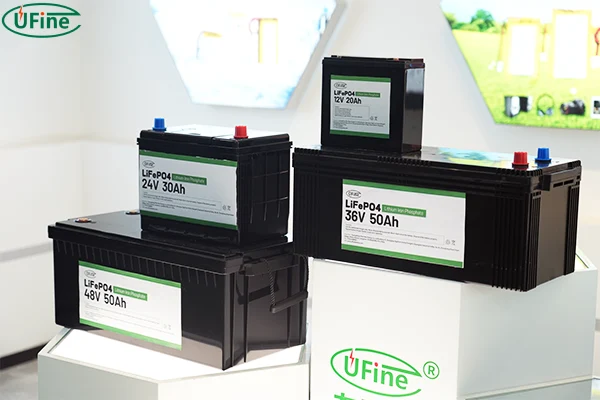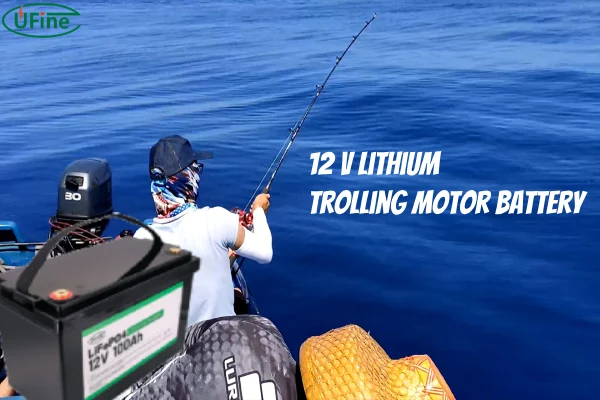Choosing the right battery for your trolling motor is crucial. Many anglers are now turning to lithium trolling motor batteries for their unmatched performance and efficiency. In this guide, we’ll explore why a lithium battery might be your best choice, offering insights into its features, benefits, and how to select the perfect one for your needs.
Part 1. What is a lithium trolling motor battery?
Lithium trolling motor batteries are a type of rechargeable battery utilizing lithium-ion technology. Unlike traditional lead-acid batteries, they boast a higher energy density. This means they can store more energy in a lighter, more compact form.
A lithium trolling motor battery is generally a lithium iron phosphate (LiFePO4) battery.
LiFePO4 batteries are a specific type of lithium-ion battery that are particularly well-suited for marine applications due to their:
- High energy density: They can store more energy in a smaller space, providing longer runtimes.
- Excellent cycle life: They can withstand many more charge-discharge cycles without significant capacity loss.
- Temperature tolerance: They perform well in a wide range of temperatures, making them suitable for various marine environments.
- Safety: They are generally considered safer than other types of lithium-ion batteries due to their lower flammability.
These characteristics make LiFePO4 batteries an ideal choice for trolling motor applications, offering improved performance, durability, and safety compared to traditional lead-acid batteries.
The core components include:
- Lithium Cells: Provide high capacity and efficient energy storage.
- Battery Management System (BMS): Ensures safety by regulating voltage, preventing overcharging, and managing temperature.
- Durable Casing: Protects the internal components from environmental factors and physical damage.
Part 2. Important parameters
Understanding key parameters helps in selecting the right battery for your needs:
- Capacity (Amp-Hours, Ah): Determines how long the battery can deliver power. Higher capacity batteries offer longer run times, crucial for extended trips.
- Voltage (V): Commonly available in 12V, 24V, and 36V. The voltage affects the motor’s power and speed capabilities.
- Weight: Lithium batteries are significantly lighter than lead-acid counterparts, enhancing boat performance and ease of installation.
- Cycle Life: Represents the number of complete charge-discharge cycles before the battery’s capacity drops significantly. Lithium batteries typically exceed 2,000 cycles, offering long-term value.
Part 3. Advantages
Lithium trolling motor batteries offer several compelling benefits:
Lightweight and Compact
Their reduced weight means less strain on your boat, improving speed and fuel efficiency. This is particularly beneficial for small boats where weight is a concern.
Long Lifespan
Lithium batteries last much longer than traditional batteries. With a lifespan often exceeding 10 years, they provide a solid return on investment despite the higher initial cost.
Fast Charging
Lithium batteries can charge quickly, minimizing downtime and allowing you to spend more time on the water. This quick recharge feature is ideal for frequent anglers.
Consistent Power Output
These batteries maintain a steady voltage throughout their discharge cycle. This means your trolling motor runs efficiently until the battery is nearly depleted, providing consistent performance.
Low Maintenance
Unlike lead-acid batteries, lithium options do not require regular water level checks or specific storage conditions, saving time and effort.
Part 4. Disadvantages
Despite their many advantages, consider these potential downsides:
Higher Initial Cost
Lithium batteries are more expensive upfront. However, their long lifespan and performance can offset this cost over time.
Temperature Sensitivity
Extreme temperatures can affect performance. While many batteries now include thermal management systems, it’s essential to consider your typical operating environment.
Specific Charging Requirements
Lithium batteries require chargers designed specifically for their chemistry. Using an incorrect charger can damage the battery or reduce its lifespan.
Part 5. 12V lithium trolling motor battery
Ideal for small boats and kayaks, the 12V lithium battery offers several benefits:
- Compact and Portable: Easy to handle and install.
- Perfect for Short Trips: Provides sufficient power for casual outings.
- Cost-Effective: Lower capacity means a more affordable entry point into lithium technology.
Part 6. 24V lithium trolling motor battery
For medium-sized boats, a 24V lithium battery strikes a balance between power and efficiency:
- Enhanced Performance: Offers more thrust than a 12V, ideal for longer trips.
- Versatile Usage: Suitable for various fishing conditions, providing reliable power.
- Moderate Weight: Easier to manage without compromising on power.
Part 7. 36V lithium trolling motor battery
A 36V lithium battery delivers maximum power, perfect for larger boats:
- High Thrust: Capable of handling strong currents and challenging conditions.
- Extended Range: Ideal for professional anglers and long fishing expeditions.
- Robust Build: Designed for durability and prolonged use.
Part 8. How to choose a lithium trolling motor battery?
When selecting a battery, consider the following:
- Boat Size and Weight: Larger boats require more powerful batteries.
- Typical Usage: Consider how often and how long you plan to use your trolling motor.
- Budget: Balance the initial cost with long-term benefits and savings.
- Compatibility: Ensure the battery’s voltage and capacity align with your trolling motor’s requirements.
- Brand Reputation: Choose reputable brands that offer good warranties and customer support.
Part 9. What size lithium trolling motor battery I should use?

Determining the right size lithium trolling motor battery depends on several factors:
- Trolling Motor Power: The more powerful your trolling motor, the more energy it will require. Check your motor’s specifications for its power rating.
- Desired Runtime: How long do you typically use your trolling motor on a single outing? A larger battery will provide longer runtimes.
- Boat Size and Weight: A heavier boat or one with more resistance (e.g., due to hull design) will require more power to move, so a larger battery might be necessary.
- Fishing Conditions: Factors like current, wind, and water depth can affect your trolling motor’s energy consumption.
- Battery Charging Capabilities: Consider the charging capacity of your boat’s charging system. A larger battery might require a more powerful charger.
A general guideline:
- Smaller boats with less powerful motors: A 12V, 100Ah battery might suffice.
- Medium-sized boats with moderate-power motors: A 12V, 200Ah battery could be suitable.
- Larger boats with high-power motors: A 24V system with multiple batteries (e.g., two 12V, 200Ah batteries) might be necessary.
Part 10. Charging and maintenance tips
Proper care and charging are crucial for maximizing your battery’s lifespan:
- Use the Right Charger: Ensure compatibility with lithium technology to avoid damage.
- Avoid Overcharging: Disconnect the battery once fully charged to prolong its life.
- Store Properly: Keep in a cool, dry place to maintain optimal performance.
- Regular Inspections: Check for any physical damage or loose connections to prevent issues.
Switching to a lithium trolling motor battery can transform your fishing experience. With their lightweight design, long lifespan, and superior performance, they offer an excellent return on investment. By understanding the different options and how to care for your battery, you can enjoy hassle-free fishing trips for years to come.
Related Tags:
More Articles

How High-Quality Lithium Battery Cells Are Made: A Comprehensive Guide
High-quality lithium battery cells stand out for their performance, reliability, and safety. Learn what sets them apart in materials, manufacturing, and testing
Comparing Mechanical Batteries and Lithium Batteries: Which Is Right for Your Application?
Explore the differences, advantages, and limitations of mechanical and lithium-ion batteries to find the best solution for your needs.
Exploring EV Battery Safety
Is your EV battery safe? Explore how EV battery safety works. Understand the role of battery cells and safety layers to protect your vehicle. Read more now!
What Type of Battery is Blade Battery? Unveiling Its True Features
Discover the key features of BYD's Blade Battery. Learn how it stands out in the market. Click to uncover its unique benefits now.
How Much Copper Goes into a Lithium-Ion Battery?
Copper is essential in lithium-ion batteries, powering devices from smartphones to EVs. How much copper is used? Let's explore the details.





